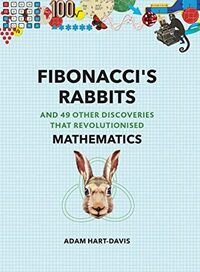You need to sign in or sign up before continuing.
Take a photo of a barcode or cover
3 reviews for:
Fibonacci's Rabbits: And 49 Other Discoveries That Revolutionised Mathematics
Adam Hart-Davis
3 reviews for:
Fibonacci's Rabbits: And 49 Other Discoveries That Revolutionised Mathematics
Adam Hart-Davis
informative
lighthearted
reflective
fast-paced
informative
fast-paced
This book needs some editing, there are places where the font is inconsistent and the formatting of the paragraphs is a mess. There is one spot where a typo fundamentally change the meaning of sentences to the opposite of what the math describes.
informative
lighthearted
slow-paced
